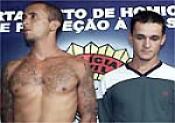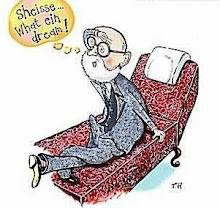The Organized and Disorganized Killer * O Assassino Organizado e Desorganizado
Science and its development is a result of a necessity for knowledge. It is very likely that sexual, serial offenders have always existed, and we even have evidence of that. But one thing is certain: they are essentially a modern phenomena. We have never seen so many of them and they have never before represented such a serious risk to society. Science grows along with the problem; the escalating number of sexual murderers stimulated the development of criminology and the method of profiling – that means using the knowledge derived from psychiatry and psychology to come up with psychological profiles of a murderer – and that knowledge is used to get to the killer faster.
The USA were the first to develop profiling methods in order to catch sexual predators. The term “serial killer” was actually first mentioned in the 60’s by Robert Ressler, a famous american profiler and criminologist for the FBI. There’s a pretty simple explanation for all this: the excellence with which americans have contributed to science, and above all else the incredible number of serial and sexual killers they have in their midst, a number higher than anywhere else in the world. A book Ressler wrote along with Burgess and Douglas is considered one of the bibles of criminal profiling – for those who want to know further the book is called “Sexual Homicide: Patterns and Motives”. In this book the authors bring up a topic which I consider to be very important to understand a killer’s behavior: the aspect of organization and disorganization of the criminal. This is what I’m going to discuss here next. You’ll notice how the sexual killer tends to fit in one of these two categories.
***
Os EUA são pioneiros nos métodos de profiling (o traçar de perfis) . O termo “serial killer”, ou assassino em série, foi mencionado pela primeira vez na década de 60 por Robert Ressler, um famoso criminologista e profiler do FBI. Há uma razão clara para isso: além da excelência cietífica que os EUA mostram para o mundo, ninguém tem uma demanda maior do que eles, quando se trata de assassinos em série. Uma das bíblias da ciência do profile foi escrita por Ressler, Burgess e Douglas – para quem se interessar, esse livro se chama “Sexual Homicide: Patterns and Motives”. Nesse livro, os autores discutem um tema que considero essencial para se começar a entender as atitudes de um assassino à solta: o quesito organização e desorganização do criminoso. E é isso que eu vou discutir aqui agora. Vocês verão como esse tipo de criminoso costuma se encaixar em uma dessas duas categorias.
The USA were the first to develop profiling methods in order to catch sexual predators. The term “serial killer” was actually first mentioned in the 60’s by Robert Ressler, a famous american profiler and criminologist for the FBI. There’s a pretty simple explanation for all this: the excellence with which americans have contributed to science, and above all else the incredible number of serial and sexual killers they have in their midst, a number higher than anywhere else in the world. A book Ressler wrote along with Burgess and Douglas is considered one of the bibles of criminal profiling – for those who want to know further the book is called “Sexual Homicide: Patterns and Motives”. In this book the authors bring up a topic which I consider to be very important to understand a killer’s behavior: the aspect of organization and disorganization of the criminal. This is what I’m going to discuss here next. You’ll notice how the sexual killer tends to fit in one of these two categories.
***
O avanço da ciencia é resultado de uma demanda de conhecimento. É bem possível que os criminosos sexuais e seriais sempre tenham existido, mas um fato é inegável: eles são um fenômeno essencialmente moderno, nunca se viu tantos deles, nunca foram um problema tão frequente e tão sério. Junto com o problema cresce a ciência; junto com os assassinos sexuais e seriais cresceu a criminologia e o método de profiling, ou seja, o uso dos conhecimentos psicológicos e psiquiátricos para se traçar o perfil psicológico de um assassino – e com isso obter mais êxito na captura.
Os EUA são pioneiros nos métodos de profiling (o traçar de perfis) . O termo “serial killer”, ou assassino em série, foi mencionado pela primeira vez na década de 60 por Robert Ressler, um famoso criminologista e profiler do FBI. Há uma razão clara para isso: além da excelência cietífica que os EUA mostram para o mundo, ninguém tem uma demanda maior do que eles, quando se trata de assassinos em série. Uma das bíblias da ciência do profile foi escrita por Ressler, Burgess e Douglas – para quem se interessar, esse livro se chama “Sexual Homicide: Patterns and Motives”. Nesse livro, os autores discutem um tema que considero essencial para se começar a entender as atitudes de um assassino à solta: o quesito organização e desorganização do criminoso. E é isso que eu vou discutir aqui agora. Vocês verão como esse tipo de criminoso costuma se encaixar em uma dessas duas categorias.





